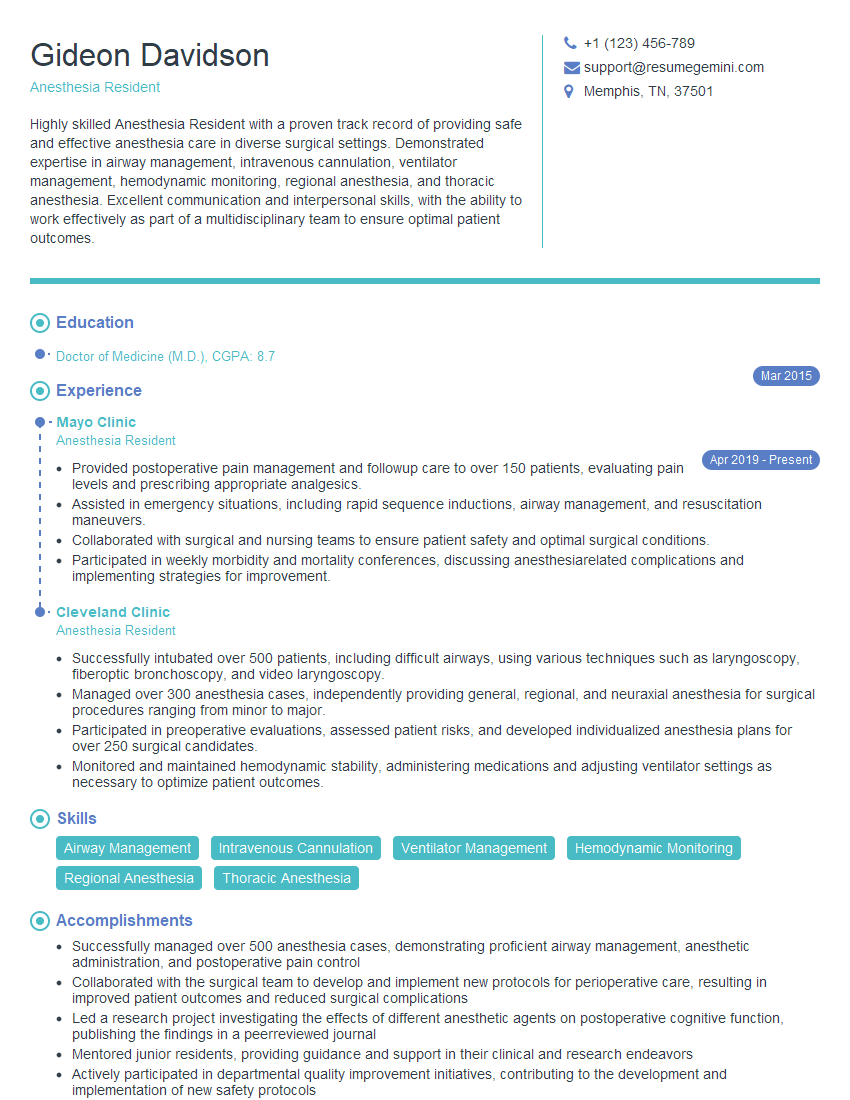Are you a seasoned Anesthesia Resident seeking a new career path? Discover our professionally built Anesthesia Resident Resume Template. This time-saving tool provides a solid foundation for your job search. Simply click “Edit Resume” to customize it with your unique experiences and achievements. Customize fonts and colors to match your personal style and increase your chances of landing your dream job. Explore more Resume Templates for additional options.

Gideon Davidson
Anesthesia Resident
Summary
Highly skilled Anesthesia Resident with a proven track record of providing safe and effective anesthesia care in diverse surgical settings. Demonstrated expertise in airway management, intravenous cannulation, ventilator management, hemodynamic monitoring, regional anesthesia, and thoracic anesthesia. Excellent communication and interpersonal skills, with the ability to work effectively as part of a multidisciplinary team to ensure optimal patient outcomes.
Education
Doctor of Medicine (M.D.)
March 2015
Skills
- Airway Management
- Intravenous Cannulation
- Ventilator Management
- Hemodynamic Monitoring
- Regional Anesthesia
- Thoracic Anesthesia
Work Experience
Anesthesia Resident
- Provided postoperative pain management and followup care to over 150 patients, evaluating pain levels and prescribing appropriate analgesics.
- Assisted in emergency situations, including rapid sequence inductions, airway management, and resuscitation maneuvers.
- Collaborated with surgical and nursing teams to ensure patient safety and optimal surgical conditions.
- Participated in weekly morbidity and mortality conferences, discussing anesthesiarelated complications and implementing strategies for improvement.
Anesthesia Resident
- Successfully intubated over 500 patients, including difficult airways, using various techniques such as laryngoscopy, fiberoptic bronchoscopy, and video laryngoscopy.
- Managed over 300 anesthesia cases, independently providing general, regional, and neuraxial anesthesia for surgical procedures ranging from minor to major.
- Participated in preoperative evaluations, assessed patient risks, and developed individualized anesthesia plans for over 250 surgical candidates.
- Monitored and maintained hemodynamic stability, administering medications and adjusting ventilator settings as necessary to optimize patient outcomes.
Accomplishments
- Successfully managed over 500 anesthesia cases, demonstrating proficient airway management, anesthetic administration, and postoperative pain control
- Collaborated with the surgical team to develop and implement new protocols for perioperative care, resulting in improved patient outcomes and reduced surgical complications
- Led a research project investigating the effects of different anesthetic agents on postoperative cognitive function, publishing the findings in a peerreviewed journal
- Mentored junior residents, providing guidance and support in their clinical and research endeavors
- Actively participated in departmental quality improvement initiatives, contributing to the development and implementation of new safety protocols
Awards
- Recipient of the American Society of Anesthesiologists (ASA) Resident Scholarship
- Honored with the Excellence in Anesthesia Research Award at the annual meeting of the Society for Neuroscience in Anesthesiology and Critical Care
- Awarded the Best Resident Case Presentation at the regional meeting of the American Association of Nurse Anesthetists
Certificates
- American Board of Anesthesiology (ABA)
- Fellow of the American College of Anesthesiologists (FACA)
- Basic Life Support (BLS)
- Advanced Cardiac Life Support (ACLS)
Career Expert Tips:
- Select the ideal resume template to showcase your professional experience effectively.
- Master the art of resume writing to highlight your unique qualifications and achievements.
- Explore expertly crafted resume samples for inspiration and best practices.
- Build your best resume for free this new year with ResumeGemini. Enjoy exclusive discounts on ATS optimized resume templates.
How To Write Resume For Anesthesia Resident
- Highlight your proficiency in airway management, emphasizing your experience with difficult airways and various intubation techniques.
- Quantify your accomplishments whenever possible, using specific numbers to demonstrate the scope and impact of your work.
- Showcase your ability to work independently and as part of a team, providing examples of your contributions to patient care.
- Include research or quality improvement projects that demonstrate your commitment to continuous learning and professional development.
Essential Experience Highlights for a Strong Anesthesia Resident Resume
- Intubate patients, including those with difficult airways, using various techniques such as laryngoscopy, fiberoptic bronchoscopy, and video laryngoscopy
- Manage anesthesia cases independently, providing general, regional, and neuraxial anesthesia for surgical procedures ranging from minor to major
- Participate in preoperative evaluations, assess patient risks, and develop individualized anesthesia plans
- Monitor and maintain hemodynamic stability, administering medications and adjusting ventilator settings as necessary to optimize patient outcomes
- Provide postoperative pain management and followup care, evaluating pain levels and prescribing appropriate analgesics
- Assist in emergency situations, including rapid sequence inductions, airway management, and resuscitation maneuvers
- Collaborate with surgical and nursing teams to ensure patient safety and optimal surgical conditions
Frequently Asked Questions (FAQ’s) For Anesthesia Resident
What are the primary responsibilities of an Anesthesia Resident?
The primary responsibilities of an Anesthesia Resident include providing anesthesia care to patients undergoing surgical procedures, managing pain, and monitoring patients during and after surgery.
What are the educational and training requirements to become an Anesthesia Resident?
To become an Anesthesia Resident, individuals must complete medical school and obtain a Doctor of Medicine (M.D.) degree. They must also complete an accredited residency program in anesthesiology, which typically lasts for three to four years.
What are the career prospects for Anesthesia Residents?
Anesthesia Residents who successfully complete their residency program are eligible to become board-certified anesthesiologists. They can work in various settings, including hospitals, outpatient surgery centers, and pain management clinics.
What are the key skills required for success as an Anesthesia Resident?
Key skills for success as an Anesthesia Resident include strong analytical and problem-solving abilities, excellent communication and interpersonal skills, and the ability to work effectively as part of a team.
What is the job outlook for Anesthesia Residents?
The job outlook for Anesthesia Residents is expected to be good in the coming years due to the increasing demand for anesthesia services and the aging population.